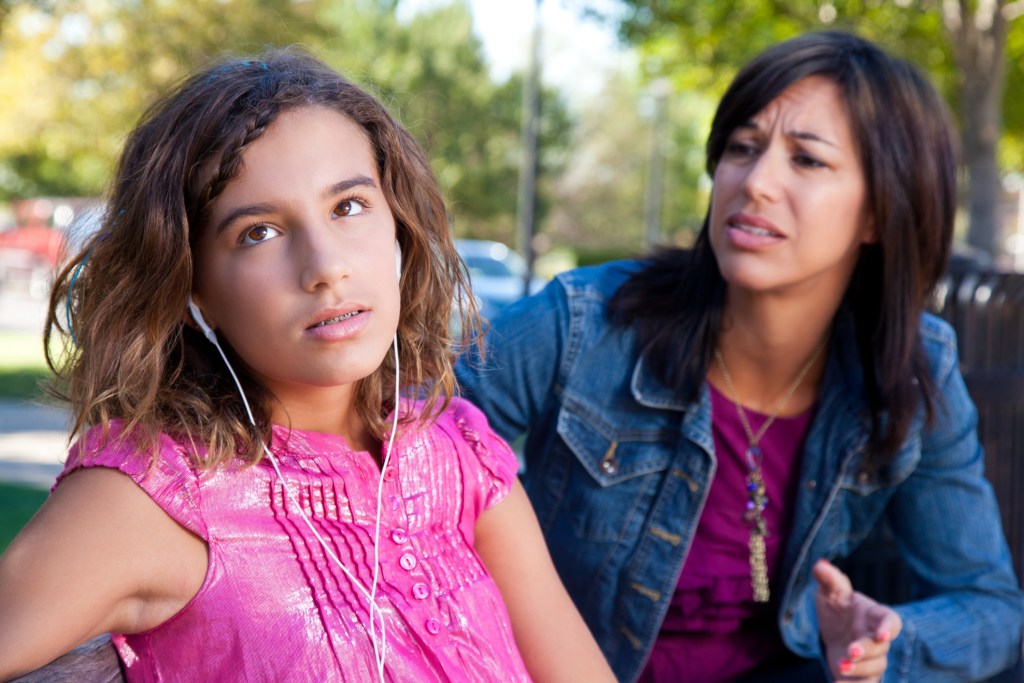If you thought the terrible twos and three-nage years were tough, they have nothing on the teenage years! Parents of teens know that these formative years are a time of great growth, transition, and adjustments for their kids that are often accompanied by hormonal mood swings and surly attitudes.
While it’s understandable that your teen may be struggling to deal with all the changes going on inside, it isn’t unreasonable to expect them to maintain a level of respect for parents and others. “While it’s important to allow for the natural breaking away process that comes during the teen years, parents also have to be sure to identify and challenge any truly disrespectful child behavior that is hurtful, rude, or demeaning to others,” writes James Lehman, creator of The Total Transformation® program. If you’ve been dealing with an angsty kid, here are some tips on how to stop teens from being rude, to best manage those moods, and to set some expectations about what kind of behavior is acceptable.

How to stop teens from being rude
Remember, it’s normal
It can be a bit of a shock for parents when their once happy-go-lucky tween is suddenly a moody, rude teenager, but it’s actually pretty normal. A lot of physical and emotional changes happen during the course of the teenage years, so it’s perfectly normal for your teen to experience the odd mood swing or two. However, rude behavior, while sometimes understandable, doesn’t need to be accepted.
Establish rules
If you’ve noticed your teen acting rude more than the occasional bad mood, it is time to set some boundaries and establish some rules about what behavior is acceptable in your home. Rules around behavior and communication need to be clear so your teen knows when they are crossing the line. Make sure they are aware that certain behaviors like talking back, slamming doors, refusal to do what is asked of her, etc., will be met with consequences. Verywell Family also notes that it’s important for parents to also model these positive behaviors so their teens know that the rules apply to everyone in the household and not just them.
Avoid arguments
Your teen’s attitude may frustrate you, but arguing with them is not the answer, especially if you’re prone to saying things you don’t mean during arguments, which will only exacerbate the situation. Instead, experts suggest walking away and taking time for all parties to cool down before approaching your teen. Always act calmly when speaking with your child to not only deescalate the mood but to model the behavior you want to see.
Focus on their behavior
HealthLink BC suggests that parents only address their teen’s behavior and not make their complaints personal when discussing rudeness. They suggest explaining to their child how their rude behavior made them feel instead of simply stating “You’re rude.” It’s also understandable to let your teen know that their behavior is frustrating and ask how they would feel the same if someone spoke to them the same way.

Talk to them
Being a teenager can be tough, so before you react to your teen’s rude behavior you should take some time to speak to her about why they’re acting the way they are. Verywell Family suggests using active listening skills to really hear why your teen may be acting in this manner. Although being rude isn’t ok, it can help to see if there are some underlying issues that may be triggering the negative behavior.
Be complimentary
Oftentimes a teen’s rude behavior simply stems from a need for attention. Good Therapy suggests giving at least five compliments for every one request each day. “The more you model that you admire your child, the more they might see what respect looks like.” Kids naturally react positively to positive reinforcement, so acknowledging when they are doing something well or acting in a way you expect may encourage them to do it more.
Do not negotiate
After you’ve set clear rules around your teen’s behavior, it’s important to have consequences in place should they not behave as expected. It’s even more important to follow through with those consequences. Whether you’ve decided to take away screen time, limit smartphone use, or some other consequence, it’s important your teen knows and understands what will happen if they break the house rules and that you enforce those rules. Don’t negotiate with your teen because that will send mixed messages about how you view the behavior.
Hang in there!
It can be very frustrating for parents who are dealing with a rude teen, but the most important thing to remember is that this behavior is completely normal! Establish an open line of communication with your teen and let them know how they are expected to behave and treat others. By modeling good behavior yourself and setting clear house rules, you should be able to curb your teen’s angsty eye-rolls and backtalk. If your teen’s bad behavior and mood swings persist, you might want to speak to your pediatrician to see if there is a deeper cause for concern.



